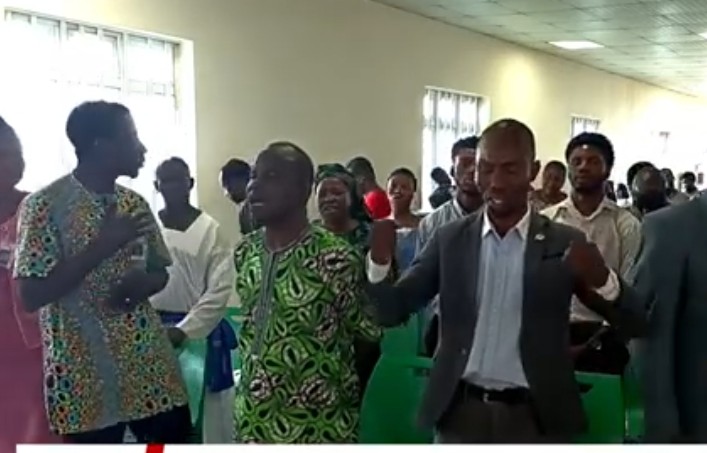Who is Christ? Who is a Christian and what is Christianity? The questions on the surface are straight forward and would have elicited immediate responses from any believer in Christ. But by the time discussants at a recent forum organized by Bearer of Light Missions answered the questions, it became clear there was a lot to learn.
For instance, many don’t know that the entire Bible from the Old Testament to the New Testament is all about Christ. Many Christians have the notion that the Bible is all about them, but the discussants were able to show from the scriptures that the Bible is all about Jesus and for Jesus.
They were able to show at the two-day conference which took place at the BOL Knowledge Centre at Igando, Lagos that God created man for his pleasure and not the other way round.

Unraveling Christ
The discussants include Pastor Kayode Oyedepo, Pastor Leke Akinola of the Upper Room Baptist, Bishop Abraham Olaleye an international evangelist and founder of the Pentecostal Congregation, Prof Ademola Adedipe, and a host of others.
Pastor Oyedepo set the ball rolling with a succinct response to the question by the convener, Dr. Sam Oyemade on who Christ is.
He reiterated the way the Bible presents Jesus as a man who did not meet man’s credentials of success.
He said, “If Jesus were to live in our days, he would have been rated a failure because he fell short of all the standards, we use to rate success. Jesus never acquired material wealth while on earth and was not celebrated, rather he was despised and eventually crucified. But what makes Jesus stand out among all the founders of religion that ever lived is that he died, rose again, and lives forever”
While emphasizing that Jesus is alive, Oyedepo said, “When the devil wants to fight Christianity, it is the idea that Jesus died and resurrected that he fights.”
Jesus and the cross
Pastor Leke Akinola pushed the discussion further noting that if Jesus had done everything without going to the cross, there would not have been the Christian faith.
He explained that the whole of the Old Testament scriptures is all about Jesus. All the prophecies and revelations in the Old Testament were to lead to the coming of Jesus.”
Also contributing, Bishop Olaleye stated that Jesus had two natures when he was physically on earth. “He was the son of man and son of God. He was both God and man.”
According to Olaleye, “The book of John gives us a clear picture of who Jesus Christ is. John makes us know the purpose Jesus came. Jesus used the word I am 7 times in the book of John to attest to divinity.”
Olaleye said however that the main contention is the name Christ which means the Messiah; the anointed one. “In actual sense, Jesus should be addressed as Jesus the Christ, not Jesus Christ. What the devil fights is the Christ because many other people bear the name Jesus.”
Also giving a perspective, Bishop Tunji Ijaola said what Christ came to do was to bring life to man while also adding that his coming to die for man has made the difference.

Why Jews are yet to accept him
But why has it been difficult for the Jews to accept Jesus the Christ as their Lord, Bishop Olaleye offers, “What Israel is suffering today is not only the opposition of neighbouring nations but also the rejection of Christ. They expected a messiah that would set them free from the then-Roman empire. They were not expecting a messiah that would be born in a manger.”
Oyedepo took it from there saying the challenge of the children of Israel which persists till today among many Christians is that they think man is the centre of the scriptures.
“We think all the promises in the Bible are for us and they are to make our lives better. We think God exists for us. We praise God so that he can bless us. But we fail to realise that whether he blesses us in the material sense of the word or not we are for him. We exist for the pleasure of God.”
He asserts, “We need to realise that God can use anything to fulfill his purpose. We exist for Christ. We are son-servants of God. We are first his son and then bondservants to him.”
Jesus at the centre of the Bible
The panel also made the point that all the promises of God in the Old Testament were pointing to Jesus.
Bishop Olaleye noted, “Instead of looking for scriptures that speak about me, why not look for scriptures that speak about him (Jesus) because the believer is in Him.”
According to Olaleye the obsession about miracles and divine intervention may lead to thinking that God is partial because some get answers to their request and some do not. “The problem with many of us is that we want to get what is meant for us in the millennia reign with Christ right now,” Olaleye said.
He urged Christians not to be agitated about material prosperity stating that “There will never be a perfect system until Jesus comes”
Pastor Akinola corroborated Olaleye’s views while also adding that “many of the scriptures directed to believers are essentially instructions.”
Meaning of blessing
Shedding further light, Olaleye said, “In the New Testament, the meaning of blessing changed. “The blessings of Abraham are not material; The blessing of Abraham is justification by faith. It is not sheep or cattle.
“There was no time he attached his blessing to material things. Abraham was living in tents. He was seeking a city whose founder is God according to the book of Hebrews.”
The discussants emphasized that Jesus came to deliver the human race from their sin. They also noted that there is nothing that happens to unbelievers that doesn’t happen to believers but that the difference is that the believer has hope of eternal life.
They reasoned that the whole essence of the Bible is about Jesus and that Christians will do well to appreciate this fact.

Christianity revisited
On day 2, Pastor Sam Oyemade kicked off the discussion with a CNN report on Christianity and the Pew research findings which states that 31.2 percent of the world population are professing Christians.
It is predicted that by 2060 the Christian population will rise to 31.8 percent of the world population.
Defining the word Christianity, Professor Ademola Adedipe says it is “a movement of those who house the anointed in them”
The discussants went on to dissect the origin of the Christian faith and how it is the solution to man’s misery. They also emphasized the uniqueness of the faith.
They agree that the Jewish religion was what birthed the Christian faith.
Oyedepo noted, “Judaism was a diagnostic process. When God gave them the law, it was for them to see they could not fulfill the law. The law was diagnostic of our sinfulness. But when Christ came, he brought a solution. Judaism and Christianity are mutually exclusive. You can’t mix the two. When you get married to Jesus, you divorce the law. When you embrace Christ, you die to the law.”
Israel as a prototype
Bishop Olaleye emphasized that “God chose the Israelites as a prototype pointing to the ultimate unique people that God will raise to himself. The salvation of the Gentiles is not an afterthought because God already promised that he would bless the whole earth through Abraham. Israel was the type, the church is the antitype. We see Jesus from the way God related with the children of Israel.”
Christians according to him have a connection with Israel. “Sentimentally we have a connection with Israel but God is not a God of sentiment. I feel for Israel because they have a covenant with God. But I feel more for Christians in the nations that are at war with them.”

Syncretism
Olaleye went on to proffer reasons why many churches are syncretic in practice tracing the cause to the African culture which bears similarities with Judaism.
Our tradition is in sync with the Torah of the Jews. “Just as Israel refused to move away from the old to the new, the church in Africa has also refused to move from their idolatry to the Christian faith.”
He cited many practices of Africa’s pagan background that have crept into the church. “The use of the bell was a pagan practice that was brought into the church. The idea of consulting prophets has its root in the pagan practice of consulting diviners and seeking solutions to mundane problems.”
He noted also that the idea of calling Jesus three times in the place of prayer was borrowed from pagan practice where the name of the enemy is invoked three times for effect.
“Many churches now found scriptures that tally with their belief in the Bible. You will be told to fetch water and allow the dew to fall into it and read Psalms into it, just the way the voodoo priest gives prescriptions on how to use their charms.”
Olaleye explained that the idolatrous tendencies were so much ingrained in the early move of God in Nigeria to the point that God had to send Pa Sidney Elton to come to Nigeria from the UK to guide the revival that broke out in 1933 “
The reason many churches still defer to the Old Covenant according to Bishop Olaleye is because it is the practices of the Old Testament that seem to attract a crowd. He warned however that we can’t sacrifice the truth of the gospel for our penchant for crowds.
Gospel contextualisation
Shedding further light on the discourse, Oyedepo noted that syncretism should not be confused with gospel contextualization.
According to him, “Christianity is the only religion that has no culture. There is no particular way to dress, no particular language to speak. Islam is not like that. Every other religion in the world has a lifestyle that is attached to it. Christianity is the only faith in the world that you can practice without changing your culture if it is not head-on with the gospel.”
He said the goal of Christianity is for us to worship God in our own culture. “There is nothing more spiritual about slow hymn and our highlife. Paul made that point when he said to the Jews, I became a Jew, to the Gentiles I became a gentile without compromising faith.”
He emphasized that the Old Testament was not written for Christians but that it is good for contextualization.
Most of the errors in the church today according to Oyedepo “were things churches picked from the Old Testament and are thrown to us in the New Testament without running them through Jesus. Christians are supposed to practice the doctrine of the apostles.”
Prescriptive and descriptive
He explained further that there is a need to know the difference between prescriptive and descriptive scriptures in the New Testament of the Bible. “If it is not prescribed, we don’t have to do it. The summary is to love God and love your neighbour. The endpoint of Christianity is love. Everything in the Old Testament is about Jesus.”
Pastor Akinola urged participants to stay with the original gospel. “We must follow on, to know him. As you seek to know him, he reveals himself more to you. The more you learn of Jesus the more you know of him. What you know of him will determine your faith and nobody will bamboozle you.”
In his concluding submission, Prof Adedipe pleaded with church leaders to stay away from practices that promote self rather than Christ. “No matter how a sheep grows, it cannot become a shepherd. We only have one shepherd. Everybody is a sheep. There could be an older sheep or a newer sheep. But we are all sheep.”
The discussants were able to establish that Christianity is not an invention. As put by Pastor Oyemade, “It has been established and concluded. It was given to us to go and understand and embrace. We can’t bring anything new into it.”


